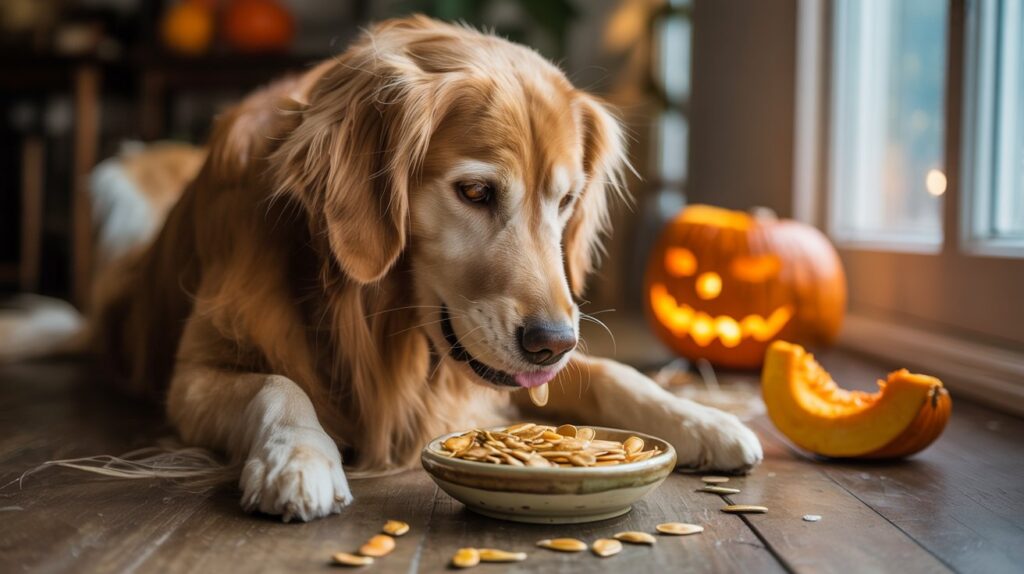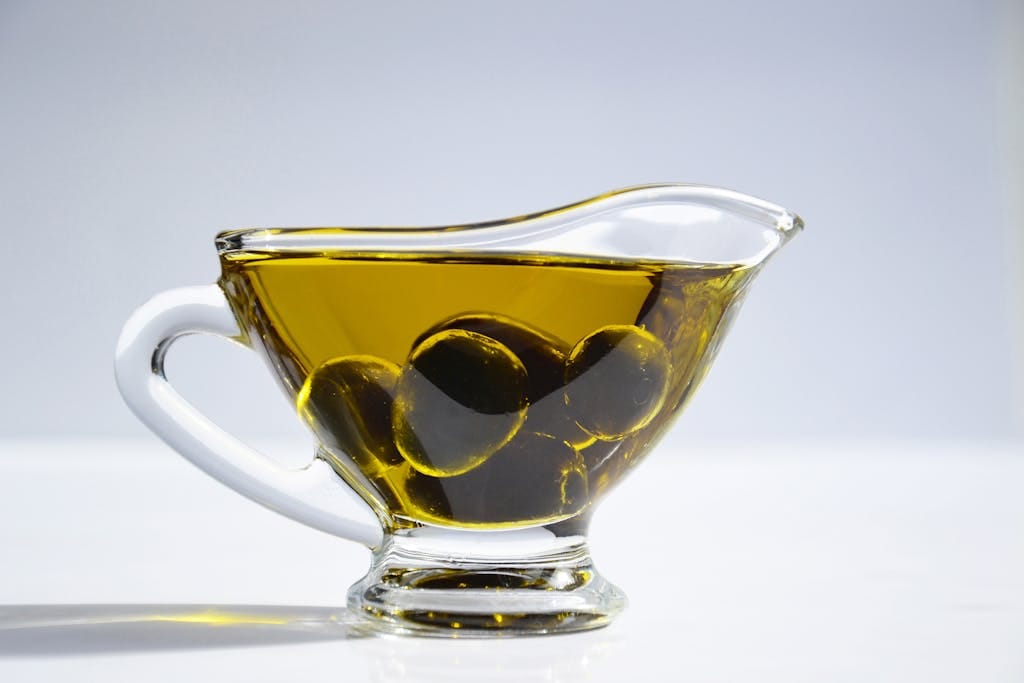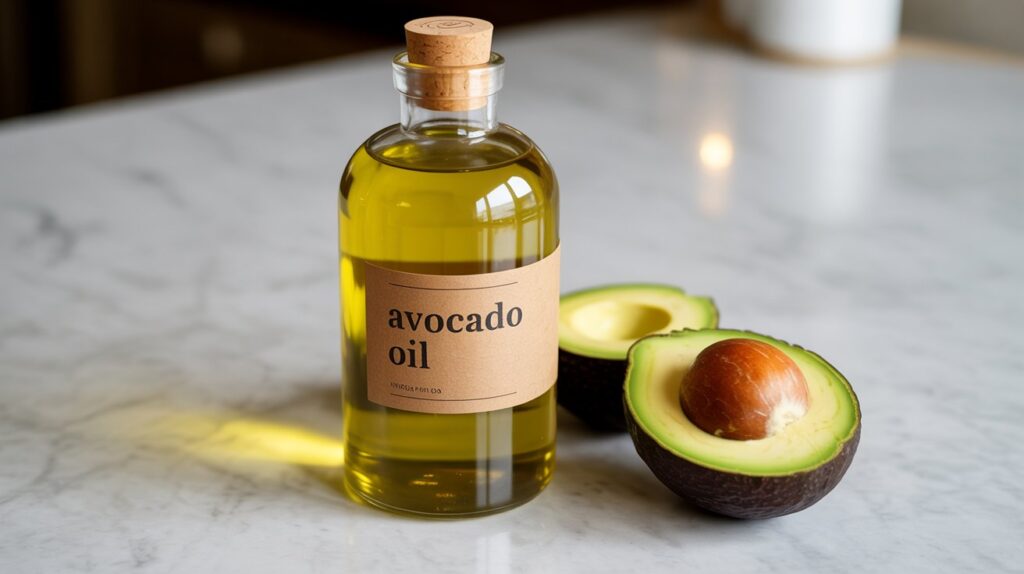Can dogs eat pumpkin seeds? Here is the complete guide. As you scoop out seeds, you may wonder if your dog can eat them. The answer is yes—with important caveats all dog owners should know.
When prepared correctly, pumpkin seeds can be a healthy, occasional treat for dogs. Avoid low-quality seeds, as they can cause health problems. This guide explains how to safely feed pumpkin seeds to your dog.
Nutritional Powerhouse: Why Your Dog Needs Pumpkin Seeds
Pumpkin seeds can benefit your dog’s health in many ways. They are rich in vitamins and minerals that support well-being.
Essential Vitamins and Minerals
- Magnesium supports muscle function, nerve impulses, bone health, normal heart rhythms, and immune function in dogs.
- Iron prevents anaemia and aids in the production of red blood cells. Working dogs, in particular, require sufficient iron for energy and stamina.
- Zinc promotes healthy skin, coat, healing, and immunity. Dogs lacking zinc may have skin problems and dull coats.
- Potassium is essential for fluid maintenance. balance, facilitating muscle contractions, and transmitting nerve signals. It supports heart function and prevents muscle weakness.
Protein and Healthy Fats
Pumpkin seeds are rich in plant proteins for muscle repair and omega-3s for healthy skin, coat, and brain function.
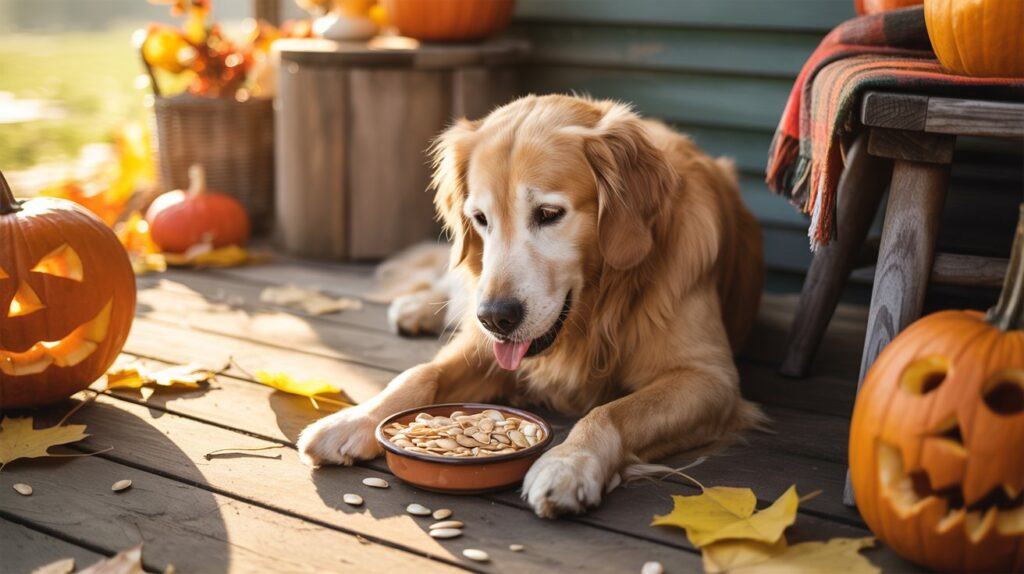
Fiber Content
Fiber in pumpkin seeds supports digestion by promoting frequent bowel movements and preventing the development of harmful bacteria. Excessive fiber intake can upset digestion, so be mindful of portion control.
Antioxidants and Cucurbitacin
Antioxidants can be found in good amounts in pumpkin seeds. to fight free radicals and may reduce inflammation. They also contain cucurbitacin, traditionally used as a natural dewormer; however, there is limited scientific evidence of its effectiveness in dogs.
Preparing Pumpkin Seeds Safely for Dogs
Properly preparing pumpkin seeds is key. Avoid raw, seasoned, or low-quality seeds, as these may be harmful to your dog.
Removing the Shells
- Never feed your dog pumpkin seeds with shells. They present a risk of choking, particularly for smaller breeds. And swallowed shells can cause dangerous blockages.
- To remove the shells, first boil pumpkin seeds for 10-15 minutes to soften them. After boiling, gently roll the seeds on a hard surface to loosen and remove the outer shell completely before offering them to your dog.
Roasting Without Seasonings
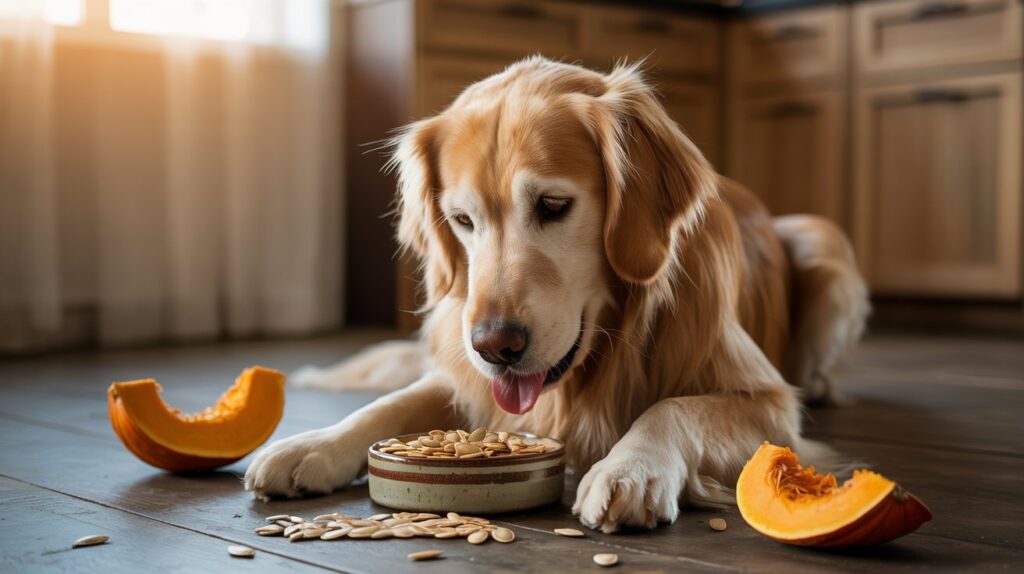
- Roasted pumpkin seeds are easier for dogs to digest and are more palatable for them. To prepare them: Set the oven’s temperature to 300°F (150°C).
- Arrange the cleaned, shell-free seeds in an even layer on the prepared baking sheet. Do not overlap them for even roasting.
- The seeds are roasted in the heated oven for 10-20 minutes. Check frequently and remove them once they turn a light golden brown to avoid overheating or burning.
- Let the seeds cool fully after roasting before serving them to your dog.
- Never add salt, oil, or seasonings. Only serve plain, roasted seeds to your dog.
Grinding Into Powder
After roasting, grind the cooled, plain seeds. Using a blender or food processor, grind into a fine powder. This powder can be sprinkled on your dog’s meal to aid in easier digestion.
Storage Guidelines
Place prepared pumpkin seeds in an airtight container in the fridge for up to one week. Pumpkin seed flour/red meal should be consumed within three days to maintain freshness and prevent spoilage.
Portion Control: What’s Safe?
Feed pumpkin seeds to your dog in moderation, taking into account their size and tolerance.
Size-Based Guidelines
- Small breeds (up to 25 pounds): 1-2 teaspoons of milled seeds or 2-3 whole seeds daily
- Medium-sized breeds (25-60 pounds): one tablespoon of ground seeds or 5-7 whole seeds daily
- Giant breeds (over 60 pounds): 1-2 tablespoons of ground seeds or 8-10 whole seeds per day
The 10% Rule
Remember: Pumpkin seeds should only be an occasional treat, never making up more than 10% of your dog’s daily calories. This ensures that your dog’s main nutrition comes from balanced dog food.
Starting Small
The first time you give your dog pumpkin seeds, serve only one or two, and then observe your dog for 24-48 hours. Then, proceed to feed a small amount at a time, such as 1 tablespoon, and watch for signs of digestive distress before increasing the amount further.
Potential Risks and Safety Concerns
Key risks associated with pumpkin seeds include choking hazards, digestive upset, and potential pancreatitis resulting from overfeeding or improper preparation. Always be cautious and understand these concerns, so you can safely share pumpkin seeds with your dog.
Digestive Issues
Pumpkin seeds can cause stomach upset, vomiting, diarrhea, or constipation if given in excess. Dogs’ digestive systems are not as well-equipped for large seeds as humans’.
Consuming high amounts of fiber can result in gas, bloating, and loose stools, especially in dogs with sensitive stomachs.
Pancreatitis Risk
Pumpkin seeds contain fat, which may cause pancreatitis in some dogs. This serious condition leads to pain and vomiting and requires prompt veterinary care.
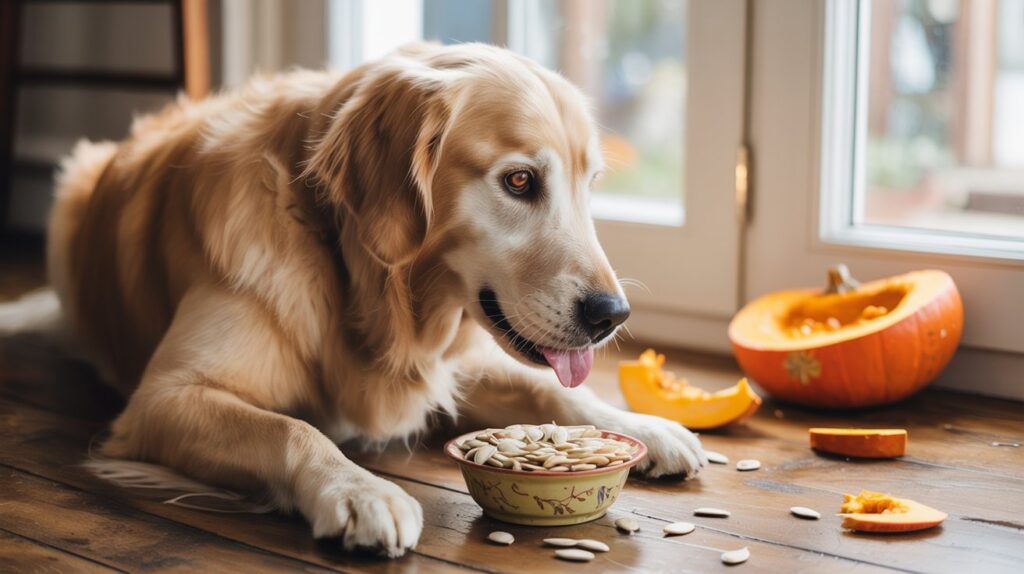
For dogs with a history of pancreatitis, obesity, or GI issues, pumpkin seeds should be avoided unless your vet approves.
Choking Hazards
Whole pumpkin seeds, especially when still in the shell, can block your dog’s throat or intestines. This choking and obstruction risk applies to all dogs but is especially high for small breeds. If your dog coughs, gags, or shows difficulty swallowing, seek immediate help.
Toxic Seasonings
Never use salted, seasoned, or oiled pumpkin seeds when feeding your pup. Ingredients such as garlic, onion powder, and excess salt are toxic and can cause vomiting, weakness, or more severe health problems. Always use plain, unseasoned seeds.
Extra Precautions for Puppies and Senior Dogs
Exercise caution when introducing new foods, such as pumpkin seeds, to puppies and senior dogs.
Puppies
Puppy digestive systems are still developing and can be far more sensitive to new ingredients. Only ever feed very fine ground pumpkin seed powder in minute quantities (less than 1/4 tsp.) and only after talking to your vet.
Choking is particularly difficult to avoid when puppies do not chew well before swallowing.
Senior Dogs
These conditions do not necessarily mean pumpkin seeds are inappropriate for your senior dog, but healthy aging brings specific dietary requirements. Be sure to factor these into your use of pumpkin seeds to support your senior dog’s well-being.
Medication interactions are possible for this reason, and it’s best to discuss new treats with your vet if your senior dog is taking prescription medications.
Other Creative Ways to Add Pumpkin to Your Dog’s Diet
If you would like to provide pumpkin’s benefits without using the seeds, consider these options:
Pumpkin Puree
Pumpkin puree without sugar (not pumpkin pie filling)is a valuable source of fiber and essential nutrients, including antioxidants, vitamins, and minerals. Add one to two tablespoons per serving to your dog’s food to support digestive health.
Pumpkin Flesh
Cooked, plain pumpkin flesh is safe and nutritious for dogs. Steam or bake fresh pumpkin, separating the seeds, and do not add any seasonings.
Commercial Pumpkin Supplements
Pumpkin seed oil supplements specifically formulated for dogs are available in pet stores and can provide benefits without requiring any home preparation.
Symptoms to Look For: When To Call Your Veterinarian
Keep an eye on your dog when feeding them pumpkin seeds. Call your vet right away if you see:
- Immediate Concerns
- Choking or difficulty swallowing
- Excessive drooling
- Vomiting or retching
- Clinical signs of abdominal pain (arched back, crying, unwillingness to move )
- Digestive Symptoms
- Diarrhea for greater than 24 hours
- Constipation or straining to defecate
- Loss of appetite
- Excessive gas or bloating
- Blood in stool or vomit
- Allergic Reactions
- It’s a rare occurrence, but some dogs are allergic to pumpkin seeds. Watch for:
- Itching or skin irritation
- Hives or rashes
- Comprar medicamentos genericos online para que se utiliza el diclofenac sodico y potasico.
- Difficulty breathing
Expert Recommendations and Best Practices
Veterinary professionals recommend offering properly prepared pumpkin seeds in moderation.
Weighing the calorie content in pumpkin seeds and apples. Next, remember to view the calorie content in apples and pumpkin seeds. “Most dogs could safely consume a few pumpkin seeds here and there — but if they’re properly prepared, and only in moderation.
Veterinary nutritionists recommend roasting them first and then slicing them into a manageable size/grinding them into a powder so it’s easy to digest.

Professional Guidelines
[Before introducing new items to your dog’s diet, always consult your veterinarian.]
- Begin with small dosages and increase incrementally,….
- Properly prepare by not seasoning or serving shells.
- Check frequently for hazards.
- Keep it in check – treats are a way to show love and should not replace a nutritious diet
Frequently Asked Questions
Are your dogs allowed to eat raw pumpkin seeds?
Roasted pumpkin seeds are easier for dogs to digest and spoil less quickly than raw ones. Never feed the shells; roasting improves digestibility.
Pumpkin seeds – can they deworm naturally?
Evidence that pumpkin seeds deworm dogs is limited. Do not use them as the sole treatment for parasites; consult your veterinarian for proper guidance and advice.
How much pumpkin seed can I give my dog?
Pumpkin seeds should be an occasional treat. Feed your dog only once or twice a week, and adjust the portion size according to their weight.
Can puppies eat pumpkin seeds?
Puppies can have small amounts of finely ground pumpkin seed powder. Ask your veterinarian before introducing new foods.
My Dog Ate Seasoned Pumpkin Seeds. What Should I Do?
Contact your veterinarian immediately, especially if the seeds contain garlic, onion, or a high amount of salt. Watch for toxicity signs like vomiting or weakness.
Is there any kind of dog that shouldn’t be eating pumpkin seeds?
Dogs with pancreatitis, severe food allergies, intestinal conditions, or those on restricted diets require veterinary approval before consuming pumpkin seeds.
Choosing The Best For Your Puppy pal
Pumpkin seeds can be a healthy occasional treat—just follow proper preparation and portioning guidelines tailored to your dog’s needs.
Keep in mind that each dog is unique and will have its own distinct dietary requirements, allergies, and health concerns. What suits one dog may not suit another. It is best to consult with your veterinarian prior to adding any new foods, especially if your dog has any underlying medical conditions. issues or is on any medications.
To recap you question “Can Dogs Eat Pumpkin Seeds”: with proper preparation and portion control, dogs can enjoy pumpkin seeds as a treat. Always monitor your dog’s response and consider safer pumpkin options, such as plain puree, if the seeds seem risky.
Bottom line: Your dog’s well-being comes first. If you are uncertain about treats like pumpkin seeds, focus on their regular, vet-approved diet. Their safety outweighs any seasonal treat.

